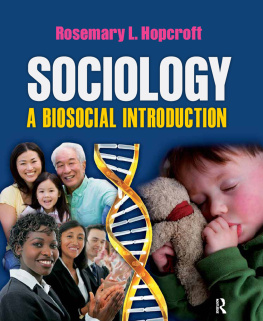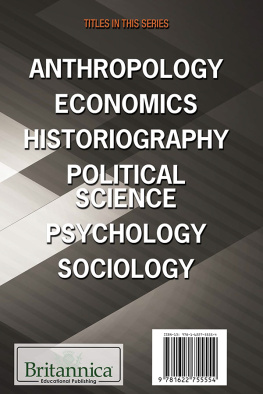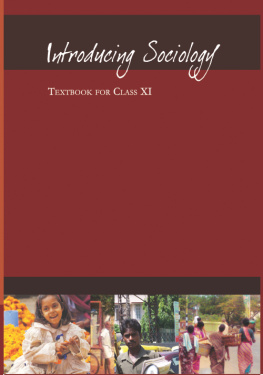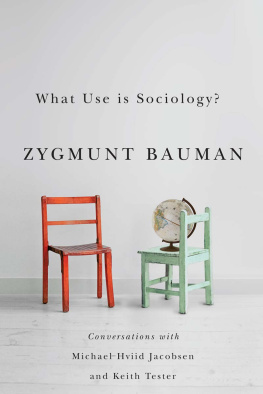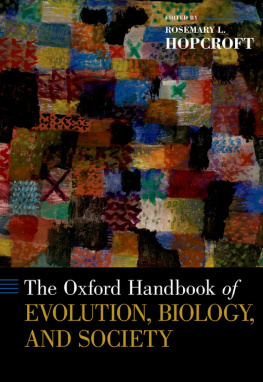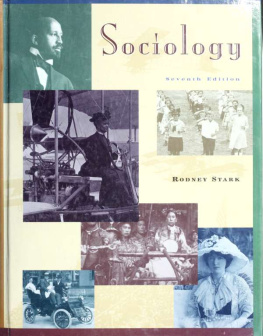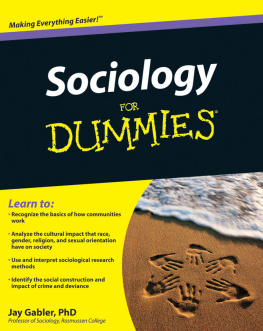Hopcroft - Sociology
Here you can read online Hopcroft - Sociology full text of the book (entire story) in english for free. Download pdf and epub, get meaning, cover and reviews about this ebook. publisher: Taylor and Francis, genre: Children. Description of the work, (preface) as well as reviews are available. Best literature library LitArk.com created for fans of good reading and offers a wide selection of genres:
Romance novel
Science fiction
Adventure
Detective
Science
History
Home and family
Prose
Art
Politics
Computer
Non-fiction
Religion
Business
Children
Humor
Choose a favorite category and find really read worthwhile books. Enjoy immersion in the world of imagination, feel the emotions of the characters or learn something new for yourself, make an fascinating discovery.
- Book:Sociology
- Author:
- Publisher:Taylor and Francis
- Genre:
- Rating:5 / 5
- Favourites:Add to favourites
- Your mark:
- 100
- 1
- 2
- 3
- 4
- 5
Sociology: summary, description and annotation
We offer to read an annotation, description, summary or preface (depends on what the author of the book "Sociology" wrote himself). If you haven't found the necessary information about the book — write in the comments, we will try to find it.
Sociology — read online for free the complete book (whole text) full work
Below is the text of the book, divided by pages. System saving the place of the last page read, allows you to conveniently read the book "Sociology" online for free, without having to search again every time where you left off. Put a bookmark, and you can go to the page where you finished reading at any time.
Font size:
Interval:
Bookmark:

SOCIOLOGY
A BIOSOCIAL INTRODUCTION
SOCIOLOGY
A BIOSOCIAL INTRODUCTION
Rosemary L. Hopcroft
University of North Carolina at Charlotte

First published 2010 by Paradigm Publisher
Published 2016 by Routledge
2 Park Square, Milton Park, Abingdon, Oxon OX14 4RN
711 Third Avenue, New York, NY 10017, USA
Routledge is an imprint of the Taylor & Francis Group, an informa business
Copyright 2010, Taylor & Francis.
All rights reserved. No part of this book may be reprinted or reproduced or utilised in any form or by any electronic, mechanical, or other means, now known or hereafter invented, including photocopying and recording, or in any information storage or retrieval system, without permission in writing from the publishers.
Notice: Product or corporate names may be trademarks or registered trademarks, and are used only for identification and explanation without intent to infringe.
Library of Congress Cataloging-in-Publication Data
Hopcroft, Rosemary L. (Rosemary Lynn), 1962
Sociology : a biosocial introduction / Rosemary L. Hopcroft.
p. cm.
Includes bibliographical references and index.
ISBN 978-1-59451-801-0 (pbk. : alk. paper)
1. Sociology. 2. Sociobiology. I. Title.
HM585.H66 2010
301dc22
2010002191
ISBN 13: 978-1-59451-801-0 (pbk)
Designed by Cindy Young and Typeset by Scratchgravel Publishing Services.
This book is dedicated to those who taught me much of what is in it: Herbert Costner, Vaughn Grisham, George Homans, Margaret Levi, Rodney Stark, Pierre van den Berghe, and Joseph Whitmeyer.
contents in brief
contents
list of photos
.
.
.
.
.
.
.
.
.
.
.
.
.
.
.
.
.
.
.
.
.
.
.
.
.
.
.
.
.
.
.
.
.
list of figure
.
.
.
.
.
.
.
.
.
.
.
.
.
.
.
.
.
.
.
.
.
.
.
.
.
.
.
.
.
.
.
.
.
.
.
.
.
.
.
.
.
.
.
.
.
.
.
.
.
.
.
.
.
.
.
.
.
.
.
.
.
.
.
.
.
.
.
.
.
.
.
.
.
.
.
list of tables
Integrating biology into sociologysociology for the 21st century
THIS TEXT IS INTENDED for introduction to sociology courses. Unlike other introduction to sociology texts, it presents a biosocial introduction to sociology. It integrates mainstream sociology with a scientifically informed model of an evolved, biological human actor. My goal for students is to have them understand that all social phenomena are a product of the interaction of the nature of individuals with the social contextnever one or the other, always both. The goal for instructors is to give them a textbook in which the inclusion of biology strengthens and enhances the sociological approach.
THE BIOSOCIAL APPROACH
Since the decoding of the human genome at the close of the 20th century, the discovery of the genetic bases of a variety of social behaviors has proceeded apace. The historic divide between sociology and biology is no longer tenable. In this new textbook, I do three things:
1. Firmly link the discipline of sociology to the other life sciences by grounding the discipline in a solid understanding of humans as an evolved, biological species.
2. Show how this linking can be done effortlessly, with little change to sociological theories and the traditional sociological foci on the importance of group dynamics, roles, norms, class, institutions, and culture. In fact, I show how the sociological perspective flows naturally out of a grounding in an evolved, biological actor, as humans evolved to be a fundamentally social species. Yet despite this grounding in the concept of the individual as an evolved actor, this does not mean that there is no disagreement in sociological theories at the level of the group. There are disagreements between and among sociological theories on occasion, and where appropriate I discuss those disagreements.
Instructors should find that the integration of the biosocial perspective does not radically change their usual approach to teaching introduction to sociology. All the standard tools of sociological analysis and the primary subject areas of sociology are covered in the text. The primary difference in topics covered is the addition of a chapter on human biology and evolved predispositions.
3. Link the biosocial approach to a comparative approach to each topic. It is important to see the flexibility of humans in different historical and material contexts. This aspect of the text owes a great debt to Gerhard Lenskis pioneering efforts in his text Human Societies. Human biology may be universal, but human social behavior differs substantially depending on the historical time period and cultural setting. Thus, information on a variety of different types of societies in different time periods is presented. A global perspective is utilized when appropriate.
I think that this new approach will make sociology both more interesting and sensible to students. Rather than just restating the obviousfor example, the statement that norms differ from group to group and are importantthis textbook shows how norms differ and, perhaps more important, how they do not differ. A grounding of sociology in biology illuminates what is typical in human social life, but it does not negate the great variety of human social life. Nor does it negate the reality of group phenomena in shaping social life, as well as the complexity of social processes in human societies. I hope to strike a balance between revealing and understanding the typical patterns of human social life, with a proper respect for the complexity and contingency of human social life. Far from genetic determinism, I show how the biological underpinnings of social behavior flexibly give rise to the great richness and variety of the human social tapestry. Both culture and biology are given their due. In all cases, I link the text to the most recent sociological research on the topics.
A SCIENTIFIC APPROACH
This biosocial approach is firmly embedded in a mainstream, positivist methodology and a belief in the importance of testing any kind of theoretical ideas with empirical data. Such data may be qualitative or quantitative. Key to all science (including social science) is not the particular way we collect data or the type of data we collect but, rather, that the data help us support or falsify hypotheses. The results of these tests in turn help us to achieve the general goal of developing better explanations (theories) of phenomena. Just as in other sciences, points of difference between sociological theories must be amenable to adjudication by the evidence. Accordingly, this text points out areas of genuine debate between contemporary sociological theories.
Given the scientific approach, this text omits sociological thinking on topics (e.g., the conflict and functional perspectives once staples of introduction to sociology texts) that does not lend itself to empirical testing of any kind. Such thinking is not helpful for understanding the evidence-based, hypothesis-testing style of contemporary sociological research. Hence, this text works better as an introduction to sociology as it currently exists than many other previous texts.
Next pageFont size:
Interval:
Bookmark:
Similar books «Sociology»
Look at similar books to Sociology. We have selected literature similar in name and meaning in the hope of providing readers with more options to find new, interesting, not yet read works.
Discussion, reviews of the book Sociology and just readers' own opinions. Leave your comments, write what you think about the work, its meaning or the main characters. Specify what exactly you liked and what you didn't like, and why you think so.

